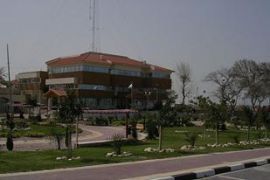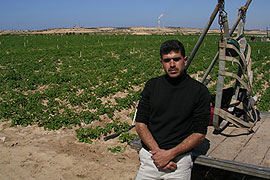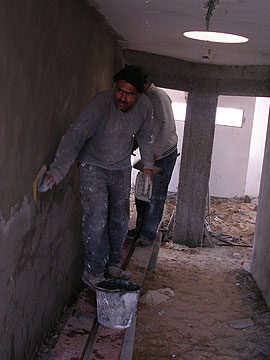Palestinians reclaim Gaza farmland
Farmers and contractors launch projects to rehabilitate former Israeli settlements.

However, where the northern settlements once stood, uprooted fields are now being replanted with strawberries, potatoes and carrots, and wells and irrigation systems are being repaired.
Loai Ali Khadeer, a 20-year-old farmer from Beit Lahiya who has planted strawberries on 10 donums (one donum is the equivalent of 2,500sq m) of rented land, says: “It’s better than before, a lot better.
“I hope it stays like this and the situation doesn’t get worse. Now there are no problems, Arabs are planting on land next to Jews.”
Khadeer is referring to fields that have been restored right up to the border with Israel.
In strawberry fields
Hamdi Fadeer is restoring a rented plot just beyond the former boundaries of Dugit settlement.
Like many other farmers Hamdi has taken out loans in order to afford renting the land and purchasing the irrigation pipes and plastic coverings he requires to maintain his strawberry fields.
 |
| Khadeer has planted strawberries on rented land close to the Israeli border |
But since the disengagement, times have been hard for the cash-strapped Gaza Strip.
Since the beginning of a financial embargo on the Palestinian Authority (PA) in March 2006, the government has not been able to pay its employees a single month’s full wages.
Farmers like Fadeer are not on the PA’s list of priorities.
Despite the financial shortcomings, however, Palestinians are eyeing foreign markets for their fruit and produce.
Abu Tamer Ghabn, director of the Agricultural Co-operative for Strawberry Farmers, said his organisation has been empowering farmers to attain new European quality standards and compete in foreign markets.
Europe is Gaza’s main export market and the farmers cannot afford to lose it.
Building universities
Meanwhile, in the former southern Gaza settlement of Netzarim Palestinian universities are building new campuses for Gaza’s quickly growing population.
When Israeli forces and settlers disengaged from this settlement some 18 months ago, they destroyed all the standing buildings, homes and warehouses.
But now, Palestinian volunteers have managed to finally clear the debris, paving room for renewed urban development.
In February the Islamic University started construction of a new branch there, which is expected to be completed in April 2008.
But there have been stumbling blocks in the rehabilitation of the former settlements, now under Palestinian control.
Slow progress
In the former settlement of Neve Dekalim, for example, the construction of al-Aqsa University’s new campus has slowed since February 2006 due to a shortage of building materials.
Workers restoring old buildings that remained intact after Neve Dekalim was vacated have complained that exports and imports continue to be controlled by Israel.
Khaled Abu Sultan, one of the engineers on al-Aqsa campus project, says: “There was a hope that all would return to normal, but it remained as it was an occupation.”
 |
| Al-Najjar, a former day labourer in Israel, says “we are building our own country” |
Shortly after Israel’s disengagement, the government-owned Palestinian Economic Development Company (PEDC) was to train farmers, manage remaining settlement greenhouses and restore destroyed greenhouses.
But with the sporadic closure of borders and an international embargo following the Hamas election victory last year, this dream of a brighter economic future in Gaza never came to fruition.
PEDC has gone bankrupt and the remaining greenhouse settlements lie dormant.
The Rafah crossing, the only gateway to the outside world for Gazan travellers remains under Israeli jurisdiction, while Israel is denying access to all Palestinian labourers into Israel.
Airspace is completely off limits, while access to the Mediterranean Sea is limited to six nautical miles, far from sufficient for the Palestinian fishing industry.
Building a country
Nevertheless, there is some sense of hope for many of the workers and planners.
Mostafa A-Najjar, a day labourer in Israel for 18 years, has been working in construction on the rehabilitation project of al-Aqsa University in Neve Dekalim.
“Praise God,” he says concerning his new job.
“I have to do everything 100 per cent because I know who I am working for – we are building our own country.”
All photographs by Philip Rizk